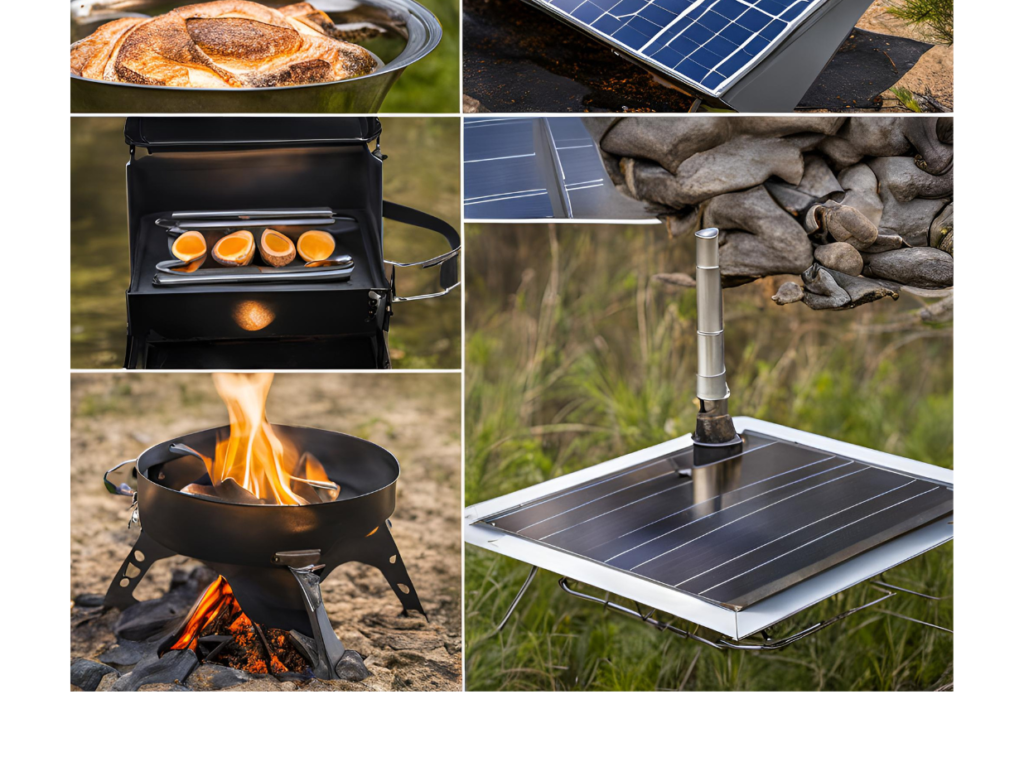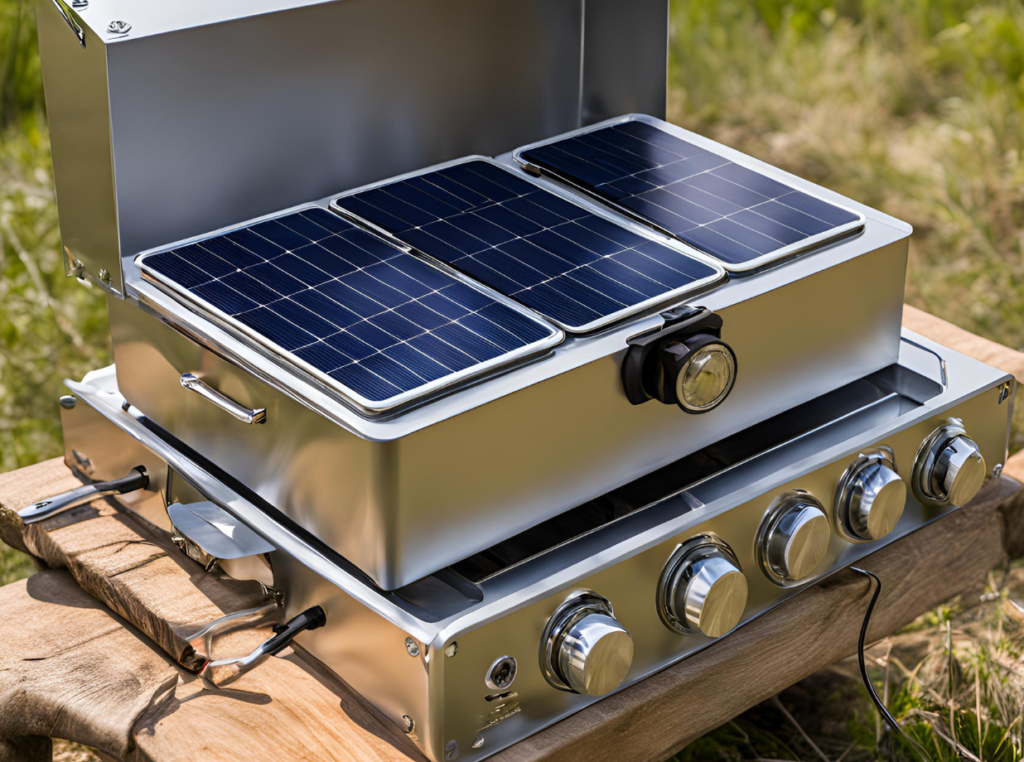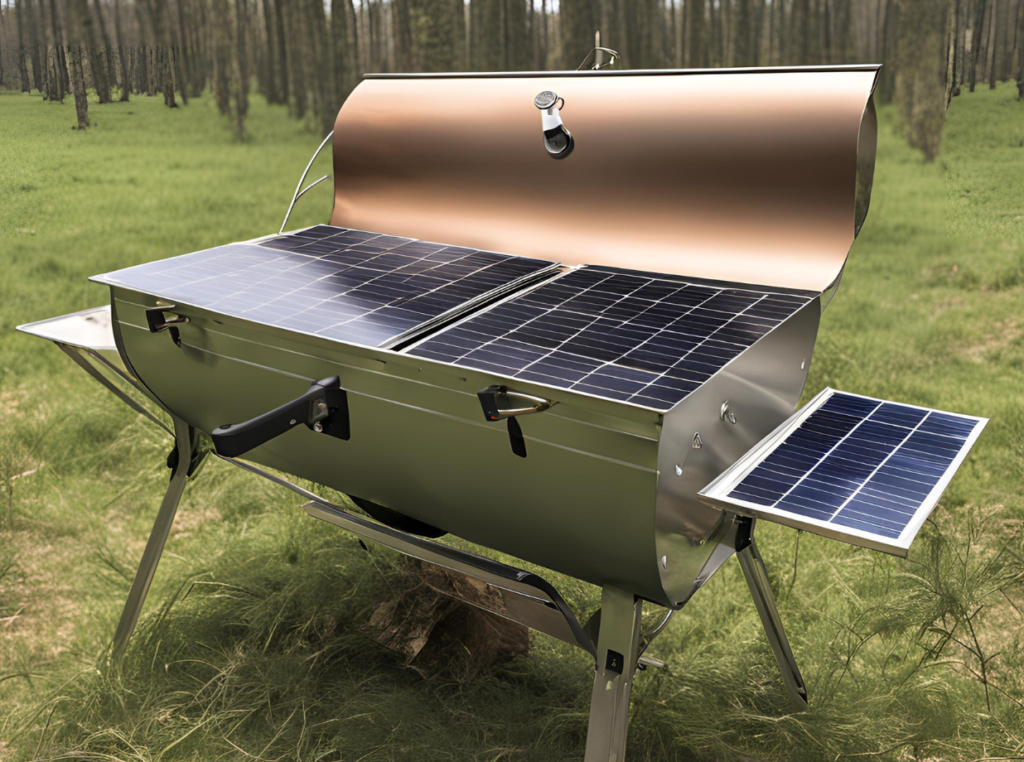Imagine a world where you can cook your favorite meals without using any gas or electricity. Now, meet the solar-powered portable stove – an innovative game-changer for outdoor enthusiasts, eco-warriors, and everyday cooks alike. This remarkable device harnesses the power of the sun, making it an environmentally friendly alternative to traditional cooking methods. Whether you’re camping in the wilderness or simply trying to reduce your carbon footprint, a solar-powered stove offers numerous advantages.
“From grilled vegetables to stews, solar cooking brings a unique flavor to your meals while promoting a sustainable lifestyle,” says Emma Green, an expert in renewable energy solutions.
- Eco-friendly: Uses no fossil fuels
- Cost-saving: Reduces utility bills
- Portable: Perfect for outdoor adventures
- Healthy: Minimizes harmful emissions
In this article, we’ll delve into everything you need to know about solar-powered portable stoves. You’ll discover how they work, the benefits they offer, and how to choose the right model for your needs. Let’s get started on your journey to eco-friendly, cost-effective, and healthy cooking!
Understanding Solar-Powered Portable Stoves: The Basics

At its core, a solar-powered portable stove harnesses the power of the sun to cook food, which is both eco-friendly and convenient, especially when you’re on the go. These stoves use reflective panels to focus sunlight onto a cooking vessel, generating heat that cooks your meal without the need for any fuel.
There are various types of solar cookers, each with its unique features and benefits. For home use or camping, dual solar cookers can provide a versatile cooking experience, allowing you to prepare multiple dishes simultaneously. Additionally, the new generation models, like the Hot Pot, have caught attention due to their innovative design and functionality. Unlike traditional box solar cookers, the Hot Pot boasts a different design approach aimed at enhancing efficiency, making it a reliable option, even in emergency situations.
One of the key highlights of solar-powered portable stoves is their ultra-portability. These devices are typically lightweight and foldable, making them easy to carry along during outdoor adventures. They also come equipped with various accessories, further expanding their utility. Whether it’s a quick meal on a sunny trail or a robust cooking solution in the aftermath of a power outage, solar stoves stand out for their ability to deliver fast and reliable cooking using nothing but sunlight.
Now imagine setting up a solar cooker at your campsite. You simply place the reflective panels in direct sunlight and let the cooker do its magic. The experience becomes not just about cooking, but also about embracing a sustainable way of living, connecting with nature, and reducing your carbon footprint.
Cooking with Sunlight: A Step-by-Step Guide
Cooking with a solar-powered portable stove is surprisingly simple and rewarding. Follow these steps to create delicious meals using nothing but sunlight:
- Placement: Start by finding the right spot. Place your solar stove in a location that gets direct sunlight for several hours, ideally between 10 AM and 4 PM. Ensure the area is free from shadows cast by trees, buildings, or other obstructions.
- Assemble Your Stove: Set up the solar stove according to the manufacturer’s instructions. Most designs are intuitive and easy to assemble, ensuring you get started with minimal fuss.
- Preheat: Just like a conventional oven, preheating is essential. Let your solar stove soak up the sun for 10-20 minutes before placing food inside. This step ensures the cooking chamber reaches an optimal temperature.
- Prepare Your Food: While the stove preheats, prepare your ingredients. Cut vegetables, marinate meats, or mix your batter. Chopping food into smaller pieces can help it cook more evenly and quickly.
- Load and Cook: Place your prepared food into black or dark-colored pots and pans, which absorb more heat. Position these inside the solar stove, ensuring they’re centrally placed for even cooking. Close the stove’s lid to trap the sun’s warmth.
- Monitor and Adjust: Check the stove periodically to monitor progress. Some meals may require stirring or flipping halfway through. If you notice the shadow lines moving away from the stove, adjust its position to keep it in direct sunlight.
- Enjoy Your Meal: Once your food is cooked to perfection, carefully remove it from the stove using oven mitts, as the cooking chamber can be very hot. Let the food rest for a few minutes before serving.
Cooking with sunlight is not only environmentally friendly but also imparts a unique flavor to your dishes. With practice, you’ll become proficient at harnessing the sun’s power for all your culinary adventures.
The Environmental Benefits of Using Solar-Powered Stoves
Solar-powered portable stoves offer numerous environmental benefits that make them an attractive option for eco-conscious individuals and families. One of the most significant advantages is their reliance on renewable energy. By harnessing solar power, these stoves eliminate the need for fossil fuels, which not only reduces greenhouse gas emissions but also decreases air pollution.
Moreover, solar cookers leave minimal environmental footprints since they don’t produce smoke or harmful byproducts. This makes them an excellent choice for outdoor enthusiasts and campers aiming to enjoy nature responsibly. Increased use of solar-powered stoves could lead to a substantial reduction in deforestation as well, because there’s no need to chop down trees for firewood.
Another essential environmental benefit is the decrease in reliance on traditional cooking fuels such as charcoal and propane. Not only are these fuels costly over time, but their extraction and transportation also contribute significantly to environmental degradation. In contrast, solar energy is abundant and freely available, ensuring a sustainable cooking method that doesn’t deplete natural resources.
On a larger scale, wider adoption of solar-powered stoves could also promote energy independence. Communities that face energy scarcity or frequent power outages can particularly benefit, as these stoves offer a reliable cooking solution without the need for electricity or conventional fuel sources. This not only improves public health by reducing indoor air pollution but also fosters local resilience and self-sufficiency.
Embracing solar-powered portable stoves can contribute to a healthier planet and pave the way for a more sustainable future. By switching to this eco-friendly cooking method, you’re taking a small but meaningful step towards reducing your carbon footprint.
Solar cookers can reduce fuel consumption by up to 70%
Cost-Effective Cooking: Saving Money with Solar Power
Imagine eliminating the need to buy expensive fuels like propane or charcoal for your outdoor cooking adventures. With a solar-powered portable stove, you harness the free, abundant energy of the sun. Over time, this can lead to substantial savings on fuel costs, especially if you regularly find yourself cooking for large groups or going on extended camping trips.
Solar stoves offer a unique blend of savings and sustainability. Initially, there’s an investment in the device itself, but that cost is quickly offset by the zero-cost energy it utilizes. Consider the price of fuel over a year; your savings will start to add up remarkably. Not only are you saving money, but you’re also reducing your carbon footprint by opting for a renewable energy source.
If you enjoy backyard barbecues or picnics, integrating a solar stove into your routine can dramatically cut down on recurring expenses. Unlike conventional grills that rely on gas or coal, solar stoves use sunlight, which is free and plentiful. Even on slightly overcast days, modern solar cookers are designed to be efficient, ensuring minimal disruption to your cooking schedule.
Additionally, solar stoves often require minimal maintenance. There are no fuel tanks to refill or burners to clean. The primary upkeep involves ensuring the reflective surfaces remain clean and unobstructed, to maximize the sun’s rays. This simplicity translates into lower long-term costs of ownership and operation, making solar-powered portable stoves a smart, economical choice for both the avid outdoor chef and the casual user.
| Feature | Traditional Stove | Solar-Powered Portable Stove |
|---|---|---|
| Fuel Cost | High | None |
| Maintenance | Requires regular cleaning and fuel refills | Minimal, mainly cleaning reflective surfaces |
| Environmental Impact | Produces emissions | Eco-friendly, no emissions |
| Operating Cost | High in the long-run | Lower long-term costs |
| Cooking Time | Variable, typically faster | Dependent on sunlight, can be slower |
| Safety | Risk of burns and fire hazards | Generally safer with proper use |
Top Health Benefits of Solar Cooking
Solar cooking goes beyond just being an eco-friendly alternative; it also offers a multitude of health benefits that make it an excellent choice for you and your family. First and foremost, solar cooking reduces indoor air pollution significantly. Traditional cooking methods, especially those using biomass fuels like wood and charcoal, can produce harmful smoke and fumes. These can lead to respiratory issues and other health problems over time. With solar stoves, there is no combustion involved, thus, no smoke or harmful emissions.
Additionally, solar cooking helps in preserving the nutritional value of your food. Because it uses a gentler, slow-cooking method, more vitamins, minerals, and antioxidants remain intact compared to high-temperature grilling or frying. This means you’re not only cooking healthier meals but also maximizing the nutrients available in the food you prepare.
Another crucial benefit is reduced risk of burns and fire hazards. Traditional stoves and open flames pose a risk, especially to children and pets around the cooking area. Solar stoves operate at lower, controlled temperatures, making them safer to use, especially in family environments.
Last but not least, solar cooking can be a great educational tool. It allows you to teach your children about sustainable living and the importance of using renewable energy sources. It also encourages a healthier lifestyle by involving them in the cooking process, teaching them about the nutritional value of different foods, and fostering an appreciation for homemade, wholesome meals.
All these health benefits make solar cooking a compelling option for anyone looking to improve their well-being while contributing positively to the environment.
The Future of Outdoor Cooking: Innovations in Solar Technology

As we look ahead, it’s exciting to see how innovations in solar technology are shaping the future of outdoor cooking. New designs like the Hot Pot are making waves with their ultra-portable, efficient, and user-friendly features. Imagine setting up camp or a picnic and having a reliable, sun-powered cooking system ready to go within minutes. It’s not just about convenience; it’s also about sustainability and independence from traditional fuel sources.
Modern solar cookers, such as the dual solar cooker models, offer versatility by combining solar ovens with other cooking methods, allowing you to bake, boil, steam, and even fry using only the power of the sun. These dual systems are making it easier than ever to adapt to solar cooking, even for those new to the concept.
A significant innovation is the improvement in solar panel technology, enhancing the efficiency and reliability of these devices. Today’s solar cookers capture and convert sunlight more effectively, even on partially cloudy days, ensuring that your cooking experience is uninterrupted.
Additionally, technological strides are being made in integrating smart features. Some contemporary solar cookers are equipped with digital thermometers and timers, helping you monitor and control your cooking process with precision, just like your home kitchen appliances.
Moreover, advancements in materials science have contributed to the development of lightweight, durable, and highly reflective materials that amplify sunlight capture. This means that solar cookers can now reach higher temperatures faster, cutting down cooking times and expanding the range of meals you can prepare.
Lastly, solar cooking is also playing a vital role in empowering communities globally. Projects that distribute solar cookers in developing regions help reduce dependency on wood and charcoal, combat deforestation, and lower carbon emissions. In conjunction with carbon credit initiatives, these projects support sustainable development and climate action goals.
The journey of solar cooking technology is an inspiring testament to human ingenuity, with the promise of a future where preparing delicious, healthy meals is both ecologically and economically beneficial.
Solar cookers can reduce the time spent collecting firewood by up to 50%
Summary
Solar-powered portable stoves represent a significant leap forward in sustainable cooking technology. Combining environmental consciousness with practicality, these stoves empower you to reduce your carbon footprint while enjoying the great outdoors. With a straightforward design and reliance on renewable energy, these devices offer numerous advantages over traditional cooking methods.
From saving money on fuel to cooking your meals in a healthier way, solar-powered stoves bring multiple benefits to the table. They harness the sun’s energy to cook food efficiently, producing no smoke and therefore posing no risk to respiratory health.
Plus, they let you take your culinary adventures off the beaten path, whether you’re camping, hiking, or just enjoying a backyard gathering.
The future of cooking is looking brighter, quite literally, thanks to ongoing innovations in solar technology. Advances in materials and design mean that solar cookers are becoming even more efficient and user-friendly. Whether you’re a seasoned outdoor chef or just starting your journey into eco-friendly cooking, there’s never been a better time to harness the power of the sun.
In conclusion, embracing solar-powered portable stoves offers an opportunity to cook sustainably, economically, and healthily. So go ahead, let the sun roast your marshmallows and melt your chocolate for the perfect s’mores, all while feeling good about your ecological choices. Here’s to deliciously bright cooking days ahead!
Frequently Asked Questions
Have questions about solar-powered portable stoves? You’re not alone! Many people are curious about how these innovative devices work, their benefits, and how to get the most out of them. Here, we’ll address some of the most common questions to help you feel confident about making the switch to solar cooking. Whether you’re considering one for eco-friendly reasons, cost savings, or simply want a more enjoyable outdoor cooking experience, we’ve got the answers you need.
How long does it take to cook food in a solar-powered portable stove?
The cooking time can vary depending on several factors, including the type and size of the food, the design of the solar cooker, and the intensity of the sunlight. For instance, a high-performing parabolic solar cooker can grill a steak in minutes, while other models might take longer. Typically, you’ll find that most solar ovens can cook a meal in about one to two hours on a sunny day.
Can I use a solar oven on cloudy days?
While solar ovens perform best under direct sunlight, some models are designed to work on partially cloudy days as well. However, cooking times will be longer in less-than-ideal conditions. If you’re planning to use your solar cooker frequently, choosing a model that’s efficient in varying weather conditions can be beneficial.
Is it safe to use a solar-powered stove indoors?
Solar-powered stoves are intended for outdoor use. They require direct exposure to sunlight to function properly, and using them indoors would negate the primary source of their energy. Always place your solar stove in a well-ventilated outdoor area for optimal and safe use.
What accessories are included with a solar-powered portable stove?
Many solar stoves come with a variety of accessories that enhance their functionality. Common inclusions might be cooking pots, baking trays, and thermometers. Some models may even come with additional features like food dehydration racks or an insulated carrying case to make transportation easier.
Can a solar stove meet all my cooking needs?
Solar stoves are versatile and can handle many cooking tasks such as baking, boiling, and grilling. However, depending on your needs and the size of the meals you’re preparing, you might find that one or more solar cookers are required to meet the demands of a larger family or more complex cooking requirements.
Is using a solar-powered portable stove difficult?
Not at all! In fact, using a solar oven can be simpler than traditional cooking methods. Unlike stovetop or open fire cooking, which may need constant supervision and stirring, solar ovens often require minimal intervention once your food is set inside. Just adjust the angle to capture the most sunlight and let it work its magic.

